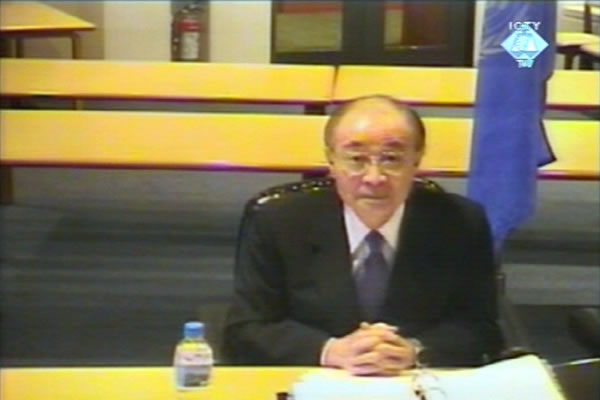Home
YASUSHI AKASHI TALKS ABOUT OPERATION STORM AFTERMATH
Former UN special envoy for the former Yugoslavia Yasushi Akashi is testifying as Gotovina's defense witness. He found it hard to recall the events from the time of Operation Storm and did not say unequivocally whether Knin was shelled indiscriminately. He did say that he toured the town after the attack and saw pieces of buildings, broken shop windows and a large number of Serb civilians who sought shelter in the UN base
 Yasushi Akashi, svjedoči video linkom u odbranu Ante Gotovine
Yasushi Akashi, svjedoči video linkom u odbranu Ante Gotovine The last week of Ante Gotovina’s defense case started with the evidence of Yasushi Akashi, former special representative of the UN Secretary General for the former Yugoslavia. When Operation Storm was launched on 4 August 1995, Akashi was in Zagreb. He visited Knin on 7 August. The statement Akashi gave to the defense in July 2009 was admitted into evidence today, but the summary was not read out in court. The three Croatian generals are charged with the crimes in Operation Storm.
Judging by the answers Akashi gave to defense counsel Luka Misetic’s questions, testifying via video link from Tokyo, time has taken its toll and Akashi couldn’t remember most of the events from the period. The Chamber got more information from the reports the witness drafted before, during and after Operation Storm than from his testimony today.
The defense counsel showed a telegram Akashi sent to the UN Secretary General Kofi Annan on 4 August 1995, describing a meeting with Hrvoje Sarinic. In the telegram, he says that Tudjman’s chief of staff undertook that ‘the whole Croatian leadership will do everything to protect the Serb civilians and UN personnel’. Noting that he remembered the meeting only up to a certain extent, the witness pointed to the part of the telegram where Sarinic pre-empts any criticism about possible collateral damage to civilians, saying, ‘war is a terrible thing and civilians always suffer the most’.
The defense counsel tried to prove that Akashi’s office received wrong reports about the indiscriminate shelling of Knin from the UN observers in the field. He himself could see the reports were wrong when he visited the town on 7 August. When he was shown an observers’ report stating that 200 to 300 shells landed on the town in the first 30 minutes of the shelling in the morning of 4 August, the witness said it didn’t necessarily meant the attack was indiscriminate, because all those shells could have landed on military targets. At the same time, he couldn’t recall if he received at the time any reports about the shelling of the Knin hospital, although he was shown reports on the topic.
The defense contends that the key document showing that the artillery attack on the town was nowhere near as fierce as the UN observers depicted it in their reports is Akashi’s telegram to Annan in which he describes his visit to Knin. In the telegram, he says, ‘My general impression s that Knin sustained damage from the shelling, but the damage, although visible, is unexpectedly small’.
Describing what he saw in Knin on 7 August 1996, the witness said ‘the town was not particularly pretty or clean even in normal circumstances’. On that day it looked like any other place after a major military attack. Parts of residential buildings could be seen on the streets, shop windows were broken. Particularly heart-rending was the sight of a large number of refugees who were trying to seek shelter in the UN base. When he was asked if he was told in the UN base what had happened in Knin during and after the attack, Akashi said, ‘They did say something, but I don’t remember what it was’. He couldn’t remember whether anyone mentioned that the Croatian soldiers had looted the town.
Akashi’s testimony will continue tomorrow.
Linked Reports
- Case : Gotovina et al. - "Operation Storm"
- 2009-09-11 DID KNIN HAVE TO BE SHELLED?
- 2009-09-10 PRESIDENT TUDJMAN’S SCHIZOPHRENIA OR INTENT?
- 2009-09-09 FOUR AGAINST ONE
- 2009-09-16 ANTE GOTOVINA'S DEFENSE RESTS
- 2009-09-16 WITNESS: CROATIA SACRIFICED ‘SELECTED CROATS’
- 2009-09-22 CERMAK’S DEFENSE CASE BEGINS
